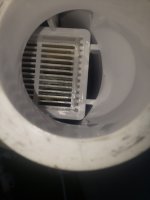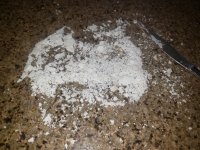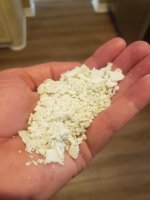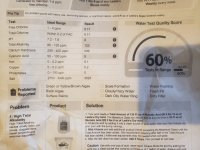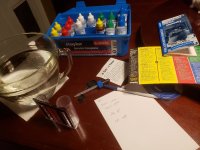Honestly, this is terrible idea. Epsom salt is magnesium sulfate. Magnesium ions are highly soluble in water and while they add to the general hardness, they will not scale out of solution. Sulfates are terrible to add to a pool for a couple of reasons - calcium sulfate scale (gypsum) will form and that is completely insoluble even in very strong acids. Calcium sulfate scale may be "softer" than calcium carbonate scale but it adheres to material surfaces just as strongly and cannot be easily removed except by glass bead blasting. As well, sulfates attack the transition metal coating on SWG plates leading to early failure. Most SWG manufacturers warn against using dry acid for pH control for this very reason. Finally, at high enough concentrations, sulfates attack concrete surfaces and metal equipment (ladders, handrails, etc) leading to advanced forms of corrosion. TFP never recommends using sulfates of any kind in a pool.
While I understand the use of magnesium salts is very popular in Australia and other countries, it is not recommended for pools. It does more harm than good and does not help with the control of carbonate scaling in any meaningful way.
Yeah, it's probably what my german boss would call "sub-optimal"

. I agree with what you're saying at high levels of sulfate and with respect to the coatings on the SWG. Lets keep it in perspective though. Regularly adding sodium bisulfite to adjust pH is going to build up far higher sulfate concentrations in the water than a one off dose of epsom salts.
I respectfully disagree with the concerns about gypsum scale and I would point out that we're talking about 40ppm. It's negligible in terms of gypsum deposition potential even in a heater. As far as corrosion goes in a heater, I would leave that one to the manufacturer of the heater, but if it's built to stand up to several thousand ppm of sodium chloride I suspect it would cope fine with 40ppm of sulfate. It's going to tie up a little bit of calcium by ion pairing, reducing the saturation in the SWG slightly and it's going to add a little bit of magnesium hydroxide into any deposit in the SWG softening it and helping it redissolve when the cell isn't running and making it easier to clean.
With respect to the SWG, I would leave that up to the manufacture, but I know that mine is compatible with it and the manufacturer actually sells the material in this application at the quoted dose. As they would have legal liability if their product caused serious corrosion issues either in SWGs or in pool equipment generally, I doubt very much that they would be pushing the stuff if there was a significant risk of damage at the recommended dose.
Realistically, this is a problem that can and should be managed by properly balancing the water so in the vast majority of cases it shouldn't be necessary. There may be just the occasional person who can benefit from it, but they would be quite rare. There's an exception to every rule isn't there ?

In terms of dry acid if I was to adjust the pH in my pool weekly with dry acid I would be adding around 4 ppm of sulfate, week in week out indefinitely and that will build up. 200 ppm in a year. Next year it's 400 ppm. After 5 years without partial changes, it's a gram per litre. Yes, dry acid is bad news. That will have an impact.
Probably the main reason not to do the epsom salts is that it makes it hard to keep track of what the calcium saturation index actually is. The Taylors kits are measuring calcium hardness rather than total hardnes, so they shouldn't pick up the magnesium , but many cheap tests and some pool shops do total hardness. That 40 ppm of sulfate comes with 9.4 ppm of Mg which equates to 40 ppm as CaCO3 (what the test reports). So if that is included in the calcium hardness it's going to be a noticeable source of error. Meanwhile the sulfate ties up 16 ppm of real calcium (41ppm as calcite) and I haven't seen any standard pool test kits with sulfate reagents. So while you can just subtract 41from the measured hardness when doing the CSI, that won't happen automatically in PoolMath. It will gradually bleed out with partial water changes and so on, but tracking it means buying an additional test kit.
As a one off if I was stuck, I'd do it. I wouldn't make a habit of it and there would be better options in most cases. We regularly have water restrictions here due to droughts. That makes it difficult or very expensive to do a partial water change. So some people might well end up with high hardness and running very low alkalinity levels or low pH comes with it's own problems. In that case a little mag sulfate is the lesser of two evils.


